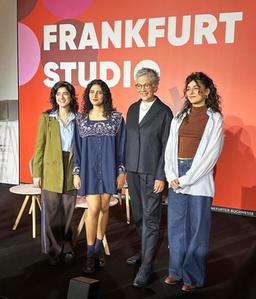 |
|
| Vanina Colagiovanni, Mehar Anaokar, Karin Schmidt-Friderichs, and Nora Haddada at the opening press conference yesterday. | |
In times like these, said German author Nora Haddada (Blaue Romanze), who filled in for Nobel laureate László Krasznahorkai during the opening press conference of the Frankfurt Book Fair yesterday morning, writers have not only an "enormous opportunity" but also a great responsibility to be "incorruptible and fearless voices of integrity."
For herself and many other writers of her generation, Haddada explained, the last two years were a "turning point." As the climate catastrophe continued and the world remained stuck to a financial system that will "blow up in our faces eventually," she said, they witnessed Germans "denounce their neighbors" for having one too many guests in their garden during Covid, the Russian invasion of Ukraine, the rise of the German far right, the "terrible and cruel" October 7 attacks, and the subsequent war in Gaza, which Haddada pointedly called a genocide.
What followed in German media, Haddada continued, "could only be called a discourse psychosis." In a startlingly short period of time, the freedom of "art, assembly, and science" were all limited, with Haddada emphasizing that it all happened amid a silence brought on by people "trying to obey orders before they were given." On Gaza and other topics, she noted, "only a few authors raised their voices."
She called the situation "horrible and alarming," and she urged authors to resist self-censorship and to overcome their fear of speaking up. "We have more to win than to lose," Haddada said, and compared to other types of artists, writers are lucky. They "don't need any money from billionaires," and writers in her generation especially "have nothing to lose." As she put it, "we are cheap, we are broke, and that's great."
Haddada described literature as a powerful weapon "against authoritarianism and censorship," and said it is beneficial to be a "slower type of art" that is "produced in seclusion and consumed in seclusion." It "gives us space to think."
"We don't have to be cowards," she said. "We can provoke."
During the session's q&a, Haddada clarified that she is not saying that all literature "has to be literature of resistance." Rather, she is telling other writers they shouldn't be afraid of saying what they have to say, and they shouldn't censor themselves to avoid problems with political and cultural institutions or the press. Even in literary fiction, she added, there are plenty of novels that are not very political.
"Not everyone has to write political fiction," she explained. "It's a question of integrity. If you want to say something, you should definitely say it."
---
Earlier in the press conference, Karin Schmidt-Friderichs, chairwoman of the Börsenverein, the German publishers and booksellers association, said the book fair opens at a time when "our democratic society is being challenged" and a handful of billionaires "increasingly decide which algorithms present which kind of information." She remarked that although "we know all the additives that go into our morning yogurt," there are no "consumer protections for the brain."
She described books as "pillars of democratic society" and characterized the book fair as a place for committing "to a charter of dialectical thinking," celebrating discourse, and "being together as humans." And while AI will be a major topic throughout the fair, she stressed the need for licenses, for voluntary labeling of AI content, and for "fair remuneration" for those whose work is "fed into the system."
Big tech, she added, "must also be measured by fair play." If generative AI benefits from creative industries, "those creative people must receive their fair share."
Juergen Boos, director of the Frankfurt Book Fair, reported that this year's show will feature more than 4,000 exhibitors from more than 100 countries, and more than 200,000 visitors are expected. He emphasized that the book fair is important not only as a place for open discussion and free expression during "very polarized times," but also as a "trading platform" for rights and a place where "the industry creates standards."
Publishers Vanina Colagiovanni, publishing director of Gog & Magog in Argentina, and Mehar Anaokar, editor at Profile Books in the U.K., also shared some of their experiences from being in the inaugural cohort of the Frankfurt Global Network, which combines the longstanding Frankfurt Fellowship and Frankfurt Invitation programs. --Alex Mutter

